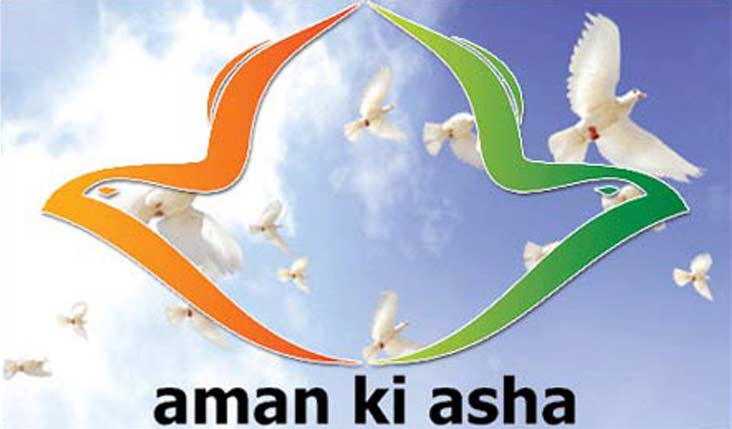By Mohammad Malick
ISLAMABAD: The two nations have repeatedly gone to war in the past. Their governments continue sabre rattling and spewing bellicose rhetoric. But identical nationwide opinion surveys conducted by the Jang Group and the Times of India Group in India and Pakistan show that a majority of the billion and a half people of the sub-continent want to live as peaceful and friendly neighbours and share the same humane goals like any other civilised polity; economic prosperity for all, education for the youth, health for the needy, absence of violence and elimination of existential threats.
In Pakistan, 72 per cent of the respondents desired “peaceful and friendly relations with India” whereas 60 per cent Indians were hopeful of such an eventuality. This relative lesser percentage may be owing to the fact that presently 88 per cent of Indians consider Pakistan as a high/moderate threat to India’s well being. In contrast, 72 per cent Pakistanis perceive India as a high/moderate threat. The 88 per cent threat perception notwithstanding, it is heartening to note, however, that over 59 per cent of Indians think that a peaceful relationship would be established with Pakistan within their lifetime, an optimism shared by 64 percent Pakistanis.
While vested interests on both sides may have led the people to believe that every Pakistani wakes up paranoid with India and that every Indian goes to bed fretting over the next deadly Pakistani move, statistics show otherwise. Half the people polled in India thought about Pakistan “sometimes”, while only 16 per cent thought about us in a more focused manner. As for Pakistanis, 32 per cent appeared to be seriously concerned over the state of our bilateral relations. Hardly the figures for two peoples supposedly obsessed with each other’s ultimate annihilation, would not you agree?
The adverse ramifications of less than friendly relations too have not been lost on either side. Over half the Indian nation feels that the tense situation has hampered both social and economic development within India itself. This feeling is even greater in Pakistan where 71 per cent people blame lack of social development on this cold war.
But having said that, both the people appear to be greater believers in the art-of-possible than their ruling dispensations. The governments stated positions notwithstanding, the priorities of both nations appear to be clear and positive. Almost three-fourths of the people interviewed on both sides of the border favoured increased business links and were convinced that such a commercial build-up could be one of the best defences against an army build-up between the two erstwhile jittery neighbours. In a significant revelation, 75 per cent of Indians want a settlement of the Kashmir issue which was recognised as a major impediment to normalisation of relations. On this side, the number was understandably higher at 84 per cent. What did not come as any surprise, however, was that cricket reigned supreme. In a region where cricket is god, 93 per cent of Indians viewed it as an important means to be utilised in the peace building process. And Pakistanis too seem to agree to this assessment.
Surveys indicate that the cohabitants of the subcontinent no longer favour the long held belief that at times peace stands on the other side of the war, for many extraordinary routes to destination peace were offered by the ordinary Indians and Pakistanis. Over half the people on both sides of the divide wanted greater people-to-people interaction with almost three-fourths believing that this interaction will dispel ‘myths’ and could lay a solid foundation for a lasting peace. In a sharp contrast, however, relations between the two governments were deemed as outright hostile by the people. Over half the people believed that greater cultural exchanges, with movies bearing the greatest load of expectations, could smooth a lot of ruffled feathers and ease down tensions. There were strong proponents on both sides, again in a majority, arguing for increased tourism including medical-tourism while a good 73 per cent rightly viewed close cooperation in education and student exchanges as another key peace building element.
That said, however, the survey results also betray the adverse impact of long held beliefs and biases, both real and imaginary, which continue to retard various peace building initiatives. While the two nations undisputedly crave peace, mutual suspicions and concerns remain a grim reality posing difficult but negotiable roadblocks on this road to peace. It is worrying indeed that when asked what at once came to their mind when the word Pakistan was mentioned, 78 per cent responded “terror”. Over half of these people attributed this perception to the recent incidents like the Mumbai attack. Over 40 per cent of Indians also feel Pakistan is responsible for promoting extremist violence. But at the same time, 41 per cent blame it on a combination of Pakistan and home-grown factors like Maoists etc. Pakistani nation too has its own fair share of fears. Almost three-thirds are convinced of Indian involvement in extremist violence within Pakistan with 31 per cent blaming it on a US-India nexus. In a sharp departure from the Indian perspective, however, when Pakistanis were asked about the first thing that came to their minds at the mention of word India, 64 per cent responded “Kashmir”. All is not lost indeed, yet suspicion runs nearly as strongly as the desire to make peace.
The surveys show that a serious, sincere and concerted effort is required to attain a peaceful equation between the two countries and it was encouraging to see that when asked to opine on possible milestones in this peace making process, invariably both nations favoured positive options like greater cooperation, rage linkups, improving internal defences and mechanisms, people-to-people contact and neither side showed any inclination towards seeking conflict-oriented resolutions. The tactics may vary somewhat but it is clear that strategically South Asia has voted in favour of making peace.








